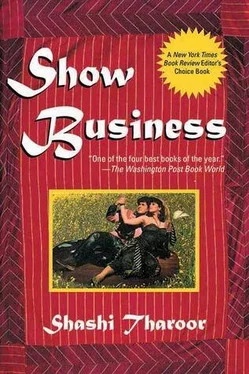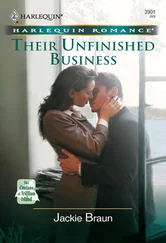“Yes, Tool, I told you. Blinds down in the car, side gate, back way into the building. As we’d agreed. Come on, Tool, give me a break, will you?”
“And don’t call me Tool. It’s undignified.”
“It’s your name, for Chrissake. I didn’t invent it.”
“Guruji sounds better.”
“Not to me. What’s all this, Tool? Are you going to abandon me, too?”
“Only if you persist in calling me by that abominable college nickname.”
I’ve never seen him so tetchy before. “OK, OK, Guruji it is,” I say. “Now act like one and give me some advice. I need it badly.”
“I know.” Tool scratches himself in an intimate place and scowls into his beard. Thejolly bright-eyed sage of our last encounter seems a world away from the irritable figure picking his toenails in front of me. Actually, he should have much more to bejolly about: thanks at least initially to my advice and guidance, he has become the rage of Bollywood, whereas his blessings have only brought me back where I started — in fact, behind where I started.
“As I see it,” he says, “your situation is this. By going away to Parliament you lost momentum; the pictures you canceled were given to other actors, some of whom did rather well. Your last hit was more than two years ago. The Mechanic flop still lingers in producers’ minds, and since then your public image has taken a beating thanks to your Swiss shenanigans. Whatever political popularity you had has been dissipated by your resignation. You are not returning to films triumphant on another field of battle, but vanquished or, at least, disillusioned. So it’s no surprise you’re no longer the obvious choice for the role of antiestablishment hero, gloriously conquering injustice and tyranny. If anything you’re seen as somehow part of the corrupt system you used to beat as a hero. In the circumstances, producers are no longer clamoring for your signature at extortionate rates; they’ve found other actors who’d do just as well for less. Right so far?”
“Thanks for cheering me up, Guruji,” I confirm bitterly.
Tool goes on, oblivious, his fingers caressing between his toes.
“Dilemma: if you say yes to one of these producers, you go down in their eyes, you become one of many, affordable, dispensable. If you keep saying no, you starve.” He smiles for the first time. “In a manner of speaking. That is how you see your choice, isn’t it?”
“You could say that,” I concede reluctantly. “So what do I do?”
“There is a third way.” Some of thejolliness returns to Tool’s face, like lights slowly coming on before a take. “A man came to see me yesterday, a fat fellow called Murthy. You don’t know him, but he’s a producer. In the South. And he’s very, very, wealthy.”
“Never heard of him.”
“He makes movies that don’t feature in the Filmfare awards and whose stars don’t get space in Showbiz, but that do extremely well with the masses. His last film grossed over a crore.”
“I can’t believe I’ve never heard of this chap. Murthy? Are you sure you’ve got the name right?”
“I’ve got the name right.” Tool tucks a foot under his thigh and blinks at me. “He makes mythologicals.”
I look at him like a tea-drinker waiting for the infusion to brew. “And?”
“That’s why you haven’t heard of him. He makes movies that people go to see as if they were going to a temple. When you go to see a reincarnation of God you don’t care who’s acting the part. So Murthy hasn’t had to look for big names in Bombay. He’s got his own regulars, and he does well with unknowns.”
“So now he wants to break in to normal Hindi films and is looking for a superstar? Me.”
“No.” Tool looks too self-satisfied as he registers my disappointment. “No, he believes in sticking to what he’s already doing well. He’ll continue doing mythologicals.”
“So why did he come to see you?”
The Guru looks at me disapprovingly beneath bushy eyebrows. “The relations between a guru and a client are always confidential,” he intones with a solemnity that, in happier times, would have made me laugh. Instead, I nod in contrite acknowledgment.
“All right,” I mumble, chastened, “but where do I come in?”
Tool raises one hand, with forefinger upright. “That’s the interesting part. Murthy is planning a new film — the mythological to end all mythologicals. A film about the end of the world. Kalki.”
I look at him, still unsure. “And?”
“You’d be perfect for the part!” the Guru beams. “The last avatar — a divine figure of grace and strength who comes into the world riding a white stallion, with a naming sword in his hand. He sees that dharma has been violated and mocked, and he launches on his divine dance of death because he must destroy a corrupt world. What a role! What a part!”
“You’ve got to be joking, Tool. Me? Do a mythological? I’d be a laughingstock.”
“N. T. Rama Rao isn’t. That’s about all he’s done, and he’s a Chief Minister. Think about it, AB. I have some influence with Murthy. I can convince him to offer you the part.”
“Convince him? Since when have I been reduced to this, Tool? In the old days a maker of mythologicals wouldn’t get in to see me. Convince him?”
“If you can do better yourself,” says Tool, affronted, into his beard, “you needn’t ask my advice.”
“I’m sorry. Go on. Let me hear the rest of it.”
“Murthy gets a big name, the biggest name he’s ever used. In turn, he delivers a massive publicity blitz, making Kalki your vehicle. You use it to restore your image — to identify yourself forever as the destroyer of corruption, not the begetter of it.”
I’m beginning to get the point. “I’m intrigued, Tool,” I admit. “I mean Guruji.”
“This,” he says with the sudden enthusiasm of a Sponerwalla, “could mark the beginning of your renaissance. A brave step to redefine yourself in the eyes of the masses. An opportunity to play the religious chord in the hearts of the Indian public. The formula wallahs don’t want you? To naraka with them! You will turn to God.”
I am swept up by his fervor, by the messianic light in his eyes. “I’ll do it, Guruji,” I breathe.
I don’t even ask him what he’s getting out of it. Or how much.
Exterior: Night
KALKI
The camera pans over a vast, arid plain, taking in an opulent city-dotted with poor people. Down its narrow streets, thin dark men in loincloths carry heavy gold-handled palanquins under whose lace canopies recline sleek women adorned with glittering jewelry. They pass a sad-eyed child wailing in the gutter, an old man lying sick and helpless on the side of the road, a cow dead or dying, flies swarming around its lank head. A beggar woman, infant at her hip, hand outstretched, asks piteously for alms. The women in the palanquins avert their imperious gazes, and the beggar stares after them as their bearers trot past, her hand still reaching out in futile hope.
Ahead, a sumptuous chariot, its gleaming carriage pulled by a healthy, impeccably white horse, comes to a halt. Its way is blocked by the broken-down cart of a ragpicker. As the mournful buffalo yoked to the cart chews ruminatively on a dry stalk, the ragpicker, his torn and dirty bundles slipping off the cart’s open back, examines his wooden wheel, which has come off entirely and tilted the cart to an acute angle.
“Out of my way!” snarls the mustachioed man in the chariot. He wears a silk tunic with a gold breastplate; bands of gold encircle his fingers, wrists, triceps and hang from his ears. He cracks his whip to lend emphasis to his command.
Читать дальше












